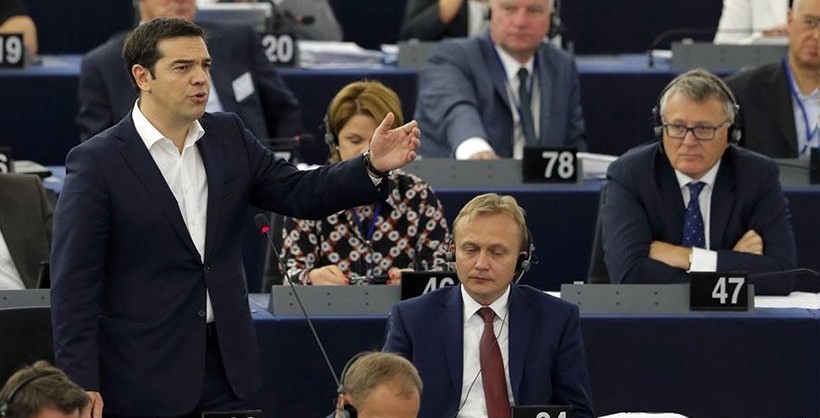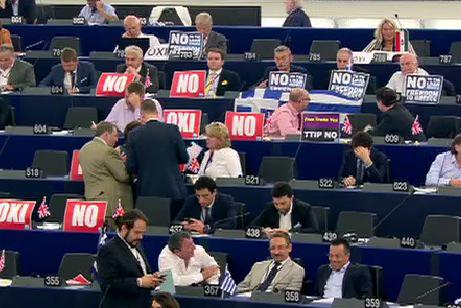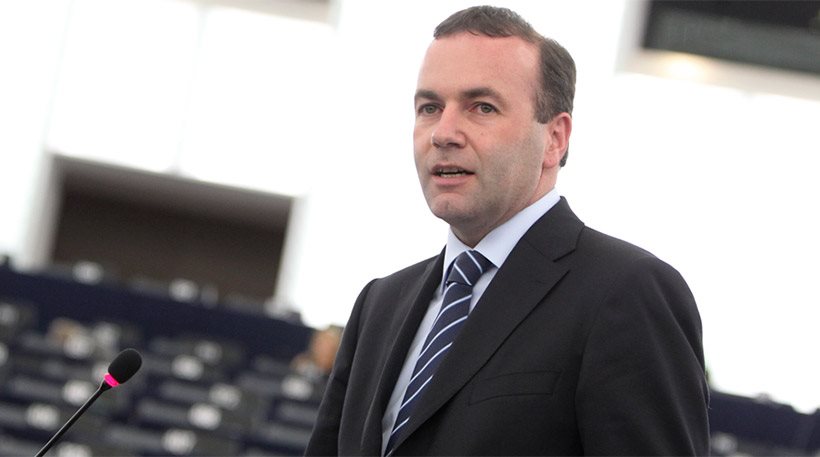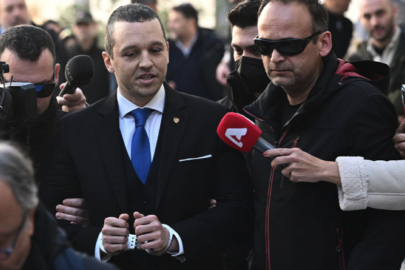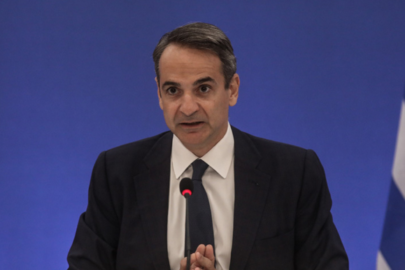(UPD-14.55pm)
Tsipras reassured his colleagues that he had no secret plan to lead Greece to the drachma. “I want a viable agreement, that’s what I’m fighting for”. Speaking of solidarity and addressing German MEP Manfred Weber, Tsipras reminded the Plenary that the strongest moment of European solidarity was in 1953, when Germany came out of 2 world wars and the people showed their greatest solidarity at the London Conference with the huge reduction of the German debt.
Juncker: We never proposed cuts in pensions and wages
EC President Jean-Claude Juncker defended himself saying that he tirelessly tried to secure a deal adding that he never asked for a cut in pensions in his plan, essentially calling Tsipras a liar. “We never recommended slashes in pensions and wages”, he said, while adding that no-one can accuse us of such proposals. The President of the European Council, Donald Tusk, said the was the final wake up call for Greece. He added that the crisis was caused by Greece overspending not the Euro currency.
Greek Prime Minister Alexis Tsipras addressed the European Parliament’s key plenary debate on the future of Greece and the conclusions of his summit meeting on Tuesday with EU leaders and of the June 25-26 European Council.
European Council President Donald Tusk and European Commission President Jean-Claude Juncker joined the debate that started at about 9.30 a.m. in the Strasbourg plenary chamber.
Tsipras was cordially greeted upon his arrival as leftist MEPs, who placed “No” cards onto their desk.
Donald Tusk
He wished the Luxembourg presidency all the best and pointed to a very challenging six months ahead. He pointed to migration as a difficult issue with 600,000 asylum applications received by the EU per year. On Greece, he spoke of a deadlock, refering to the EU Summit calling for an acceleration necessary. He said he would avoid focusing on the pros and cons of a referendum. Regarding Tuesday’s meeting, he said there was an exchange of views with Tsipras called to submit his country’s proposals.
Jean-Claude Juncker
His address was brief, explaining that he wishes to deepen the EMU rather than dissolve it.
Alexis Tsipras
Tsipras said that the media terrorized the people telling them that a ‘no’ was a choice for Greece to have a rift with Europe – and was cheered by MEPs. He denied that this was the case as a ‘no’ – on the contrary – was a return to democracy. He looked at the foundations of the EU. He said that the Greek government wants respect of the democratic choice of the people. “I, personally, and my government rose to power five months ago, but the rescue packages have been around for five months. I can only take responsibility for the last five months,” he said, underlining that the deadlock in Greece and Europe are not the result of five months but five years of programs that did not lead us out of the crisis. (cheers)
“The message of the referendum is that Europe will be democratic or it will have immense difficulties surviving,” he said, while pointing to the brave choice of Greek people not a decision to rupture with Europe. A decision to return to founding principle of Europe.”
“We have sent a request to ESM and we hope that we can reach an agreement,” he said.
“Austerity measures were imposed on many countries, but these programs were not as harsh or as long in duration of those of Greece,” he said, refering to an “experiment” that failed with unemployment and poverty shooting up as well as fiscal debt at 128% of the GDP. “The majority of people feel they have no choice than to seek to be freed from these policies,” he said. Tsipras said that he wants a deal, but one that shows that “there is light at the end of the tunnel.” He said that nobody denies the need for reforms, but the burden needs to be placed on those who can handle the weight – not pensioners or low wage-earners.
Tsipras wants to strengthen development and have a discussion on the viability of debt, without taboos! He said that the money given to Greece never reached the Greek nation but were absorbed by banks. Greece has yet to receive money benchmarked for the country from August, 2014, “and it was not our government that was in power from August, 2014, through December, 2014, and the program was not implemented then, either,” he said.
“I am not one of the politicians that believe that bad foreigners are to blame for Greece’s suffering,” he said, adding that previous Greek government’s reinforced corruption and left tax evasion by large wealth go unpunished. 10% of Greeks are in charge of the majority of Greek wealth, and yet they did not contribute to the salvation of the country that the less wealthy groups were called to solve.
Political power – oligarchs – banks were the triptych that Tsipras said remained in tact, serving their own interests rather than the general well-being of the people of Greece. He said that the Greek proposals are aimed at changing Greece. “These are reforms that past political systems did not want to be enforced in Greece,” he said pointing to cartels and the media market.
He did not want a rift with Europe but with domestic corruption. “Europe is at crossroads,” he said pointing that there was a European, and not solely a Greek program. He pointed to European history as one of conflict and compromise, of convergence and unity, but not division. “That is why we call it the European Union, let us not make it the European dis-Union,” he said, calling for an “honorable solution”. “We all understand the crucial meaning of the history. We will respond. We will take historic responsibility,” he said.
German MEP Manfred Weber
Weber went straight for the jugular stating that Tsipras and his government are responsible for the crisis. He said that he had expected the prime minister to apologize for “unacceptable statements” that were passed over in silence. “You are destroying confidence in Europe,” he said.
“Don’t lie to the people, debt haircut won’t hurt bankers, it will hit nurses in Slovakia and public officials in Finland,” he said, adding that other states have got on with reforms. He also suggested that other eurozone countries should hold their own referendums to stop shoveling cash into Greece.
Liberal ALDE leader Guy Verhofstadt
He said that Europe is “sleepwalking towards a Grexit” and was critical that the Greek government did not come up with any reforms. He suggested that a plan would be to end the “clientelist system” in Greek politics that rewards loyalty with jobs, to downsize the public sector and to end privileges for the military, the Orthodox Church, the Greek islands and political parties. “You need to come forward with your reform package, it is not a chicken or egg situation,” he said.
UKIP Head Nigel Farage
“The European project has started to die. The plan has failed. The whole of the Mediterranean finds itself in the wrong currency. There is a new Berlin Wall and it is called the euro” he said. Turning to Weber’s attack on Tsipras, he praised the Greek government for calling a referendum against the “bullies” in Brussels. “If you have got the courage you should lead the Greek people out of the eurozone with your head held high. Yes, it will be tough for the first few months, but with a devalued currency and friends all over the world you will recover.”
European Parliament’s President Martin Schulz will chair the debate.
At 8.30 a.m., Luxembourg’s Prime Minister Xavier Bettel will present and discuss the working priorities of the incoming Council Presidency. Luxembourg, a founding member of the European Union, is taking up the six-month rolling presidency of the Council for the 12th time.

